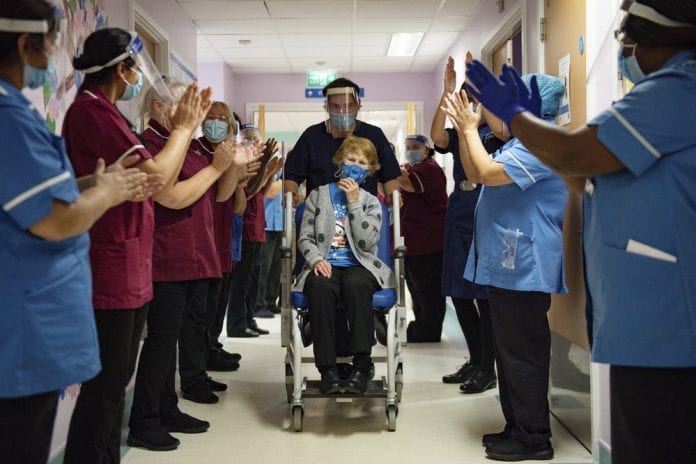LONDON (AP) — A retired British shop clerk received the first shot in the country’s COVID-19 vaccination programme Tuesday, the start of an unprecedented global immunisation effort intended to offer a route out of a pandemic that has killed 1.5 million.
Margaret Keenan, who turns 91 next week, got the shot at 6:31 a.m. on what public health officials have dubbed “V-Day.”
She was first in line at University Hospital Coventry, one of several hospitals around the country that are handling the initial phase of the United Kingdom’s programme.
As luck would have it, the second injection went to a man named William Shakespeare, an 81-year-old who hails from Warwickshire, the county where the bard was born.
“I feel so privileged to be the first person vaccinated against COVID-19,” said Keenan, who wore a surgical mask and a blue Merry Christmas T-shirt decorated with a cartoon penguin wearing a Santa hat.
“It’s the best early birthday present I could wish for because it means I can finally look forward to spending time with my family and friends in the New Year after being on my own for most of the year.”
The UK is the first Western country to start a mass vaccination programme after British regulators last week authorised the use of a COVID-19 shot developed by US drugmaker Pfizer and Germany’s BioNTech.
US and European Union regulators may approve the vaccine in the coming days or weeks, fuelling a global immunisation effort.
Britain’s program is likely to provide lessons for other countries as they prepare for the unprecedented task of vaccinating billions of people.
UK health officials have been working for months to adapt a system geared toward vaccinating groups of people like school children and pregnant women into one that can rapidly reach much of the nation’s population.
Britain has received 800,000 doses of the Pfizer vaccine, enough to vaccinate 400,000 people.
The first shots will go to people over 80 who are either hospitalised or already have outpatient appointments scheduled, along with nursing home workers and vaccination staff. Others will have to wait their turn.
Health officials have asked the public to be patient because only those who are most at risk from the virus will be vaccinated in the early stages. Medical staff will contact people to arrange appointments, and most will have to wait until next year before there is enough vaccine to expand the programme.















